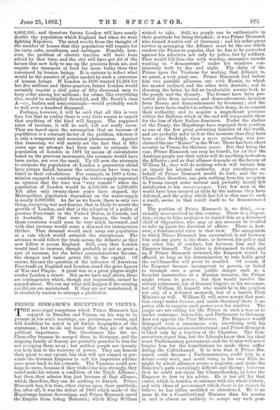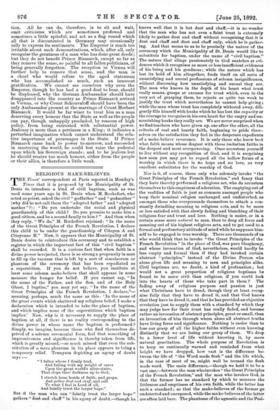PRINCE BISMARCK'S RECEPTION IN VIENNA.
THE semi-regal receptions which Prince Bismarck has enjoyed in Dresden and Vienna, on his way to be present at his son's marriage, are picturesque events, and will doubtless be noted in all future biographies of the statesman ; but we do not know that they are of much political importance. The Dresdeners like the ex- Chancellor because he merged them in Germany, and the reigning family of Saxony are probably grateful to him for not sweeping them away ; but neither people nor dynasty can help him to the recovery of power. They can honour their guest to any extent, but that will not compel or per- suade the German Emperor to call his imperious adviser once more back to his counsels. The Viennese could per- haps do more, because if they wished for him strongly, they could make his return a condition of the Triple Alliance ; but then, they admire him just because of that alliance, which, therefore, they can do nothing to disturb. Prince Bismarck has, it is true, other claims upon their gratitude, for, after all, it was the defeat of 1866 which made of the Hapsburgs lenient Sovereigns, and Prince Bismarck saved the Empire from losing Bohemia ; which King William wished to take. Still, no people can be enthusiastic in their gratitude for being thrashed ; it was Prince Bismarck who turned Austria out of Germany ; and his subsequent service in arranging the Alliance must be the one which renders the Prince so popular, that -he has to be protected against his admirers not only by police, but by soldiers. They would kill him else with worship, successive crowds wanting to " demonstrate" under his windows con- tinuously both by day and night. The claim of the Prince upon the Viennese for making that Alliance is, we grant, a very great one. Prince Bismarck had before him two possible alliances, one with Russia, to which his master inclined, and the other with Austria ; and in choosing the latter, he did an incalculable service both to the people and the dynasty. The former have been pro- tected alike from invasion and dismemberment, invasion from Russia and dismemberment by Germany ; and the latter have been enabled to reform their Army, to re-cement their authority, and to acquire a magnificent province within the Balkans which in the end will compensate them for the loss of their Italian dominion. Under the shelter of the Treaty, the Hapsburgs have regained their position as one of the few great governing families of the world, and are probably safer in it at this moment than they have been since Rudolph, then a mere princeling, was pro- claimed the one "Kaiser" in the West. There has been sweet security in Vienna for thirteen years. But that being the case, Prince Bismarck can reap no benefit, for re'ther the Austrian people nor their rulers will do anything to weaken the Alliance ; and as that alliance depends on the favour of William II., they will do nothing which will irritate him or impair his internal authority. Any interference on behalf of Prince Bismarck would do both, and the ex- Chancellor, therefore, can gain nothing from his reception in Vienna except some natural and probably keenly felt satisfaction to his amour-propre. Very few men in the world have been treated as idols by the nations they have defeated, and the policy which has led in this case to such a result, seems in that result itself to be demonstrated wise.
The position of Prince Bismarck is, we think, occa- sionally misconceived in this country. There is a disposi- tion, owing to false analogies, to regard him as a dismissed chief of Opposition, who may at any moment be recalled to take up again the direction of affairs. There is, how- ever, a fundamental error in that view. The antagonism to which Prince Bismarck has succumbed, is not between him and any party in the State, or between his policy and any other line of conduct, but between him and the Emperor himself. The latter is determined to rule, and as, if Prince Bismarck returned, the Emperor would le effaced, so long as his determination to rule holds good the ex-Chancellor will never be recalled. Of course, if the Emperor became incompetent to govern, or failed to triumph over a great public danger such as a Socialist insurrection or a Russian invasion, the Prince might return to power ; but that would involve the virtual retirement, not of General Caprivi or his successor, but of William II. himself, who would be in the position not only of a defeated monarch, but of a beaten First Minister as well. William II. will never accept that posi- tion except under duresse, and inside Germany there is no power able to exercise such power over his resolves. The people are not calling for the Prince in such a way as to render resistance impossible, and Parliament in Germany does not appoint the First Minister. The Emperor would disregard even a unanimous vote interfering with his right of selection, as unconstitutional ; and Prince Bismarck is liked only by a fraction of the Chamber. The Con- servatives regret him, but the Liberals know that his ideal is not Parliamentary government, and the Centre will never forgive him for the humiliations he made them suffer during the Culturkampf. It is true that if Prince Bis- marck could become a Parliamentarian, could join in a debate every week, and could bring in his own Bills, he might by adroit alliances secure a majority, and make the Emperor's path exceedingly difficult and thorny ; but even then he could not claim the Chancellorship, or force the Emperor to bow to his advice. He is too old for that career, which is, besides, at variance with his whole history, and with ideas of government which there is no reason to believe he has either modified or abandoned. He is no more fit for a Constitutional Minister than his master is, and is almost as unlikely to accept any such posi- tion. All he can do, therefore, is to sit and wait, emit criticisms which are sometimes profound and sometimes a little spiteful, and act as a flag round which all that is discontented in Germany may occasionally rally to express its sentiments. The Emperor is much too irritable about such demonstrations, which, after all, only recognise the greatness of a man who has done great deeds ; but they do not benefit Prince Bismarck, except so far as they remove the sense, so painful to all fallen politicians, of being generally forgotten. The reception in Vienna will further help to remove that sense, and the man is a churl who would refuse to the aged statesman who has accomplished so much, such an innocent gratification. We cannot see ourselves why even the Emperor, though he has had a good deal to bear, should be displeased, why the German Ambassador should have disappeared into the country as Prince Bismarck arrived in Vienna, or why Count Schouvaloff should have been the only Ambassador present at the marriage of Count Herbert Bismarck. It would be far wiser to treat him as a man deserving every honour that the State as well as the people can pay, though unhappily precluded, by reasons of high policy, from being entrusted with substantial power. Jealousy is more than a pettiness in a King ; it indicates a perturbed imagination which cannot understand the rela- tive importance of personages in the State. If Prince Bismarck came back to power to-morrow, and succeeded in mastering the world, he could but raise the pedestal upon which his Sovereign stands ; and to be jealous lest he should receive too much honour, either from the people or their allies, is therefore a little weak.



































 Previous page
Previous page